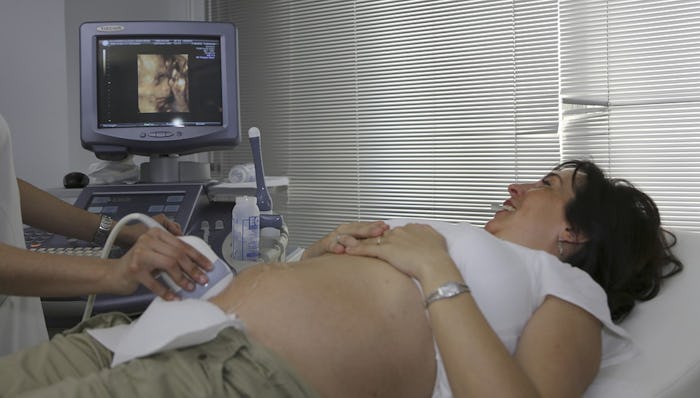Life
7 Things You Didn't Know You Could Learn About Your Baby In An Ultrasound
You'll experience a few ultrasounds during some of your many pregnancy doctor's visits. Although this screening is most famously known for giving you a sneak peek at your child and learning their gender, there are some things you didn't know your could learn about your baby in an ultrasound. The technological advances have been able to prepare expecting parents for issues with their baby that they may not have otherwise learned until after the baby was born. Being able to plan for any medical attention the baby could need soon after birth gives parents and doctors a chance to work together in advance.
Chances are, you are only going to have two ultrasounds throughout the course of your pregnancy. The information gathered from these routine procedures is usually enough to gather the necessary information about your baby's growth and development. But should you need additional imagine, Baby Center noted that, "a follow-up test shows that a suspicious ultrasound is no cause for concern. But in the unlikely event that your baby has a health problem, the information from the ultrasound can help your practitioner determine how to give your baby the best outcome possible."
But you don't have to wonder what is being examined while your belly is scanned with a gooey wand. These seven things you didn't know you could learn about your child in an ultrasound will keep you in the know.
1Birth Defects
With each trimester of your pregnancy, you are screened for a number of things. One of the issues an ultrasound can reveal is the presence of any birth defects, as the website for the Centers for Disease Control and Prevention pointed out. If your doctor believes an ultrasound shows the possibility that your baby could have a birth defect, additional tests are ordered to determine the specific problems.
2Internal Organ Growth
As your baby grows and develops, every little part of them is forming. To monitor the progress of your baby's growth, ultrasounds look for internal organ development to confirm all those precious pieces are coming together as they should, according to The Society of Obstetricians and Gynecology or Canada's website.
3Intrauterine Growth Restriction (IUGR)
If your baby isn't growing at the appropriate gestational rate, it's possible IURG could be the reason. According to What To Expect's website, to accurately test and measure for IURG, an ultrasound is ordered by your doctor. Sometimes, your baby may just be small, however sometimes there is an underlying genetic cause of IURG.
4Head Size
Typically done closer to the end of your pregnancy, Baby Center noted that an ultrasound can determine the size of your baby's head. This can give the doctor an idea about how your baby is growing in the final weeks before you give birth.
5Muscle Tone
As your baby moves around, the way they extend and flex their limbs can reveal information about their growth. As the website for the American Pregnancy Association reported, muscle tone is detected by ultrasound during the third trimester of pregnancy, when the baby is significantly developed.
6Blood Flow
According to Parents magazine, to make sure the baby is getting enough blood while in the womb, a special ultrasound is used. A Doppler ultrasound can detect the blood circulation, blood flow, and blood pressure.
7Breathing
Woman with high-risk pregnancies tend to have more ultrasounds that woman with what is considered a normal pregnancy. As Fit Pregnancy magazine pointed out, this condition could require an ultrasound which checks in on the baby's breathing.
